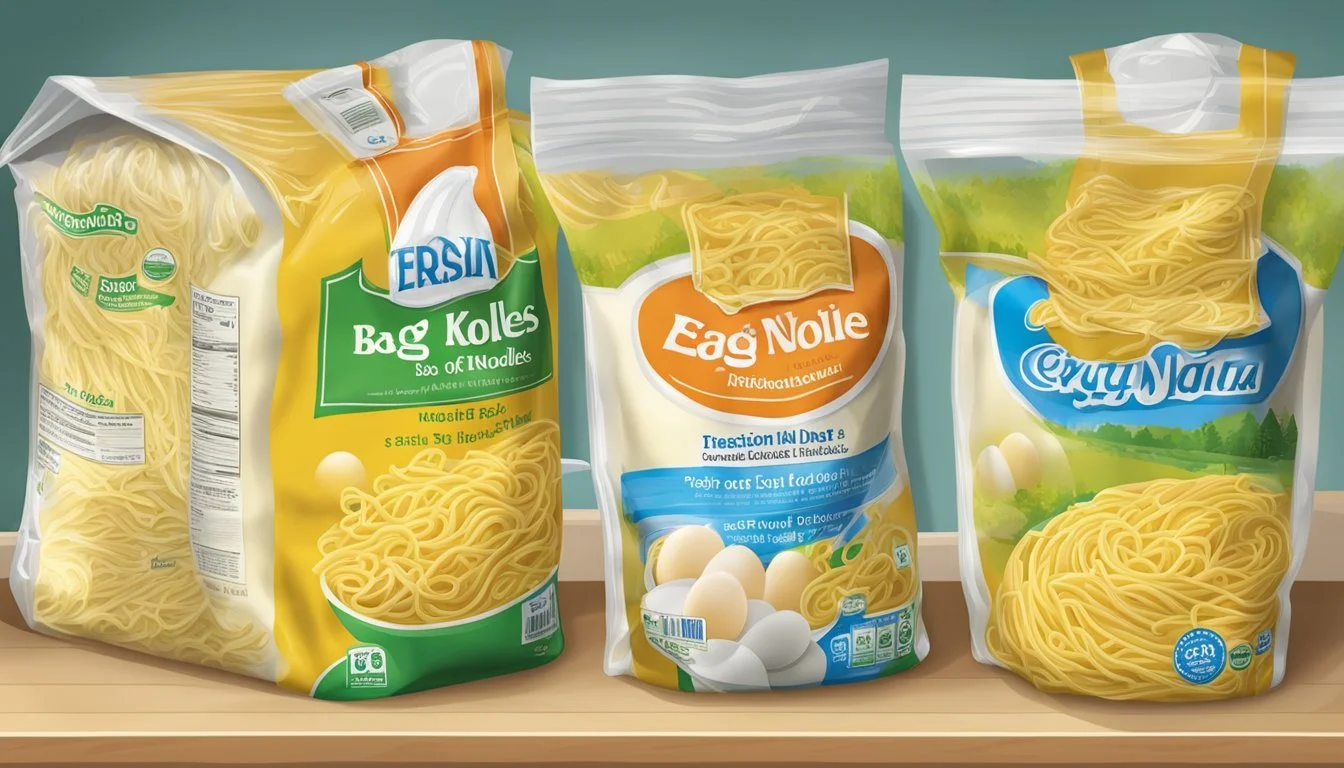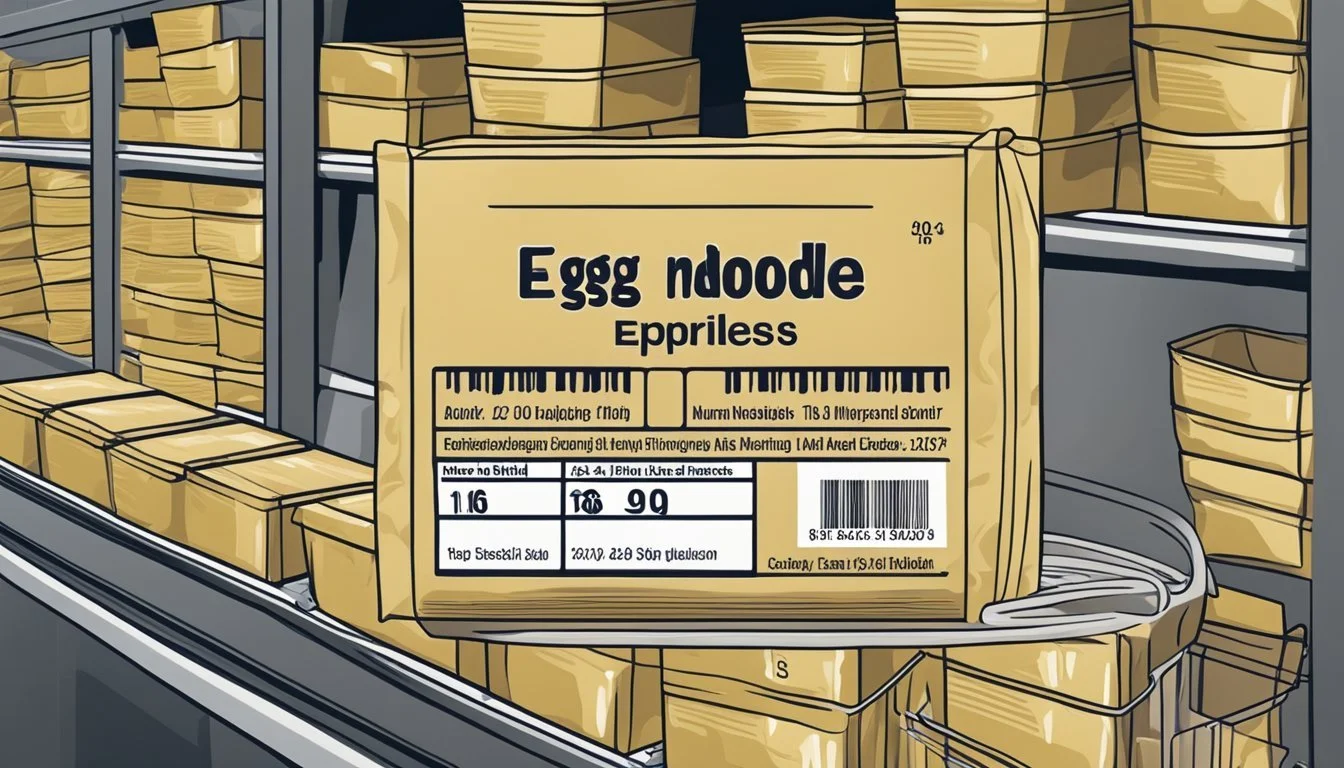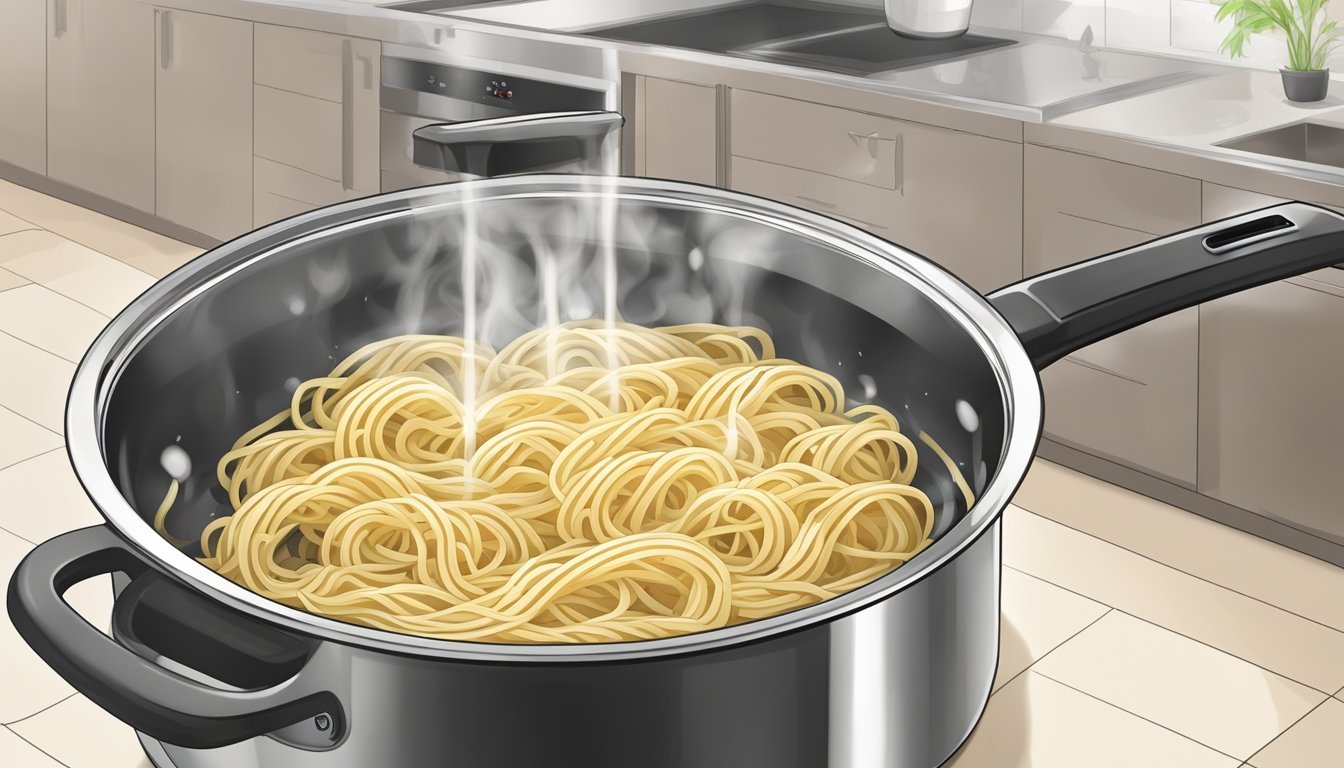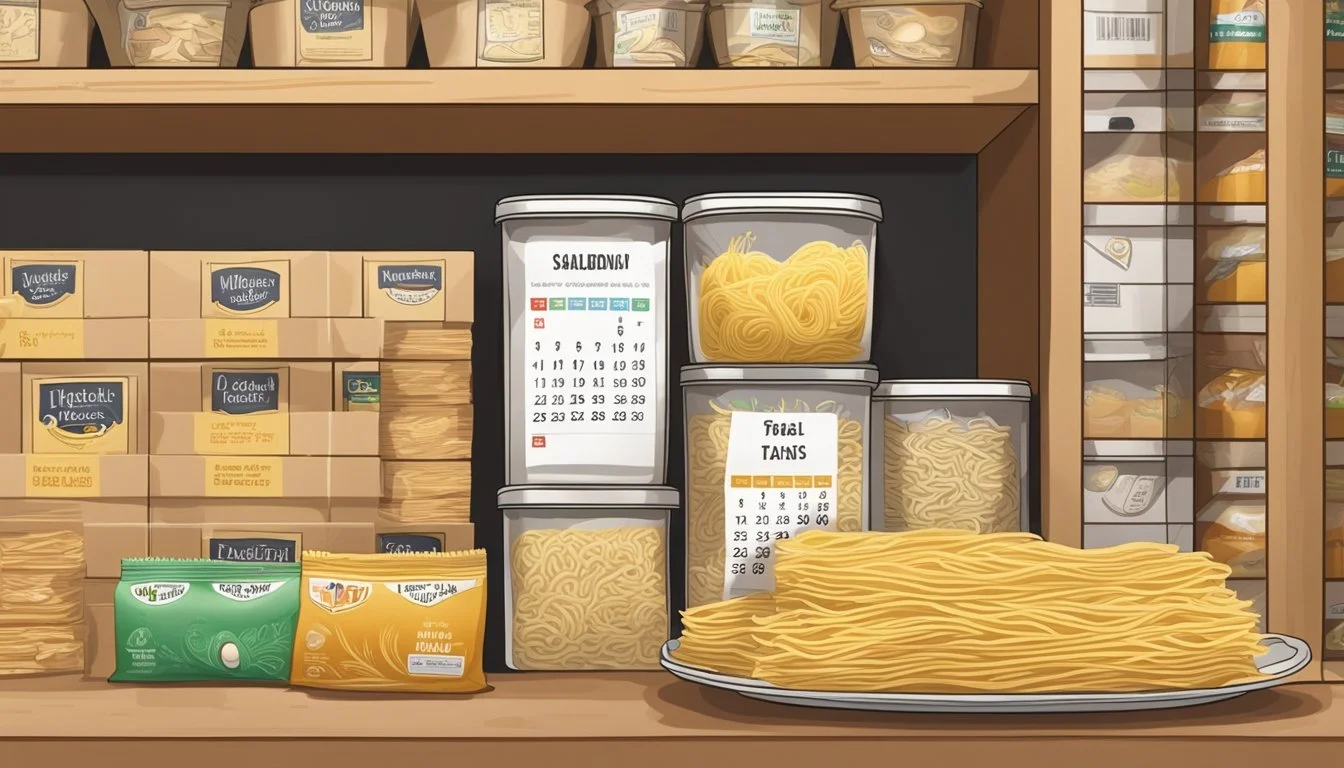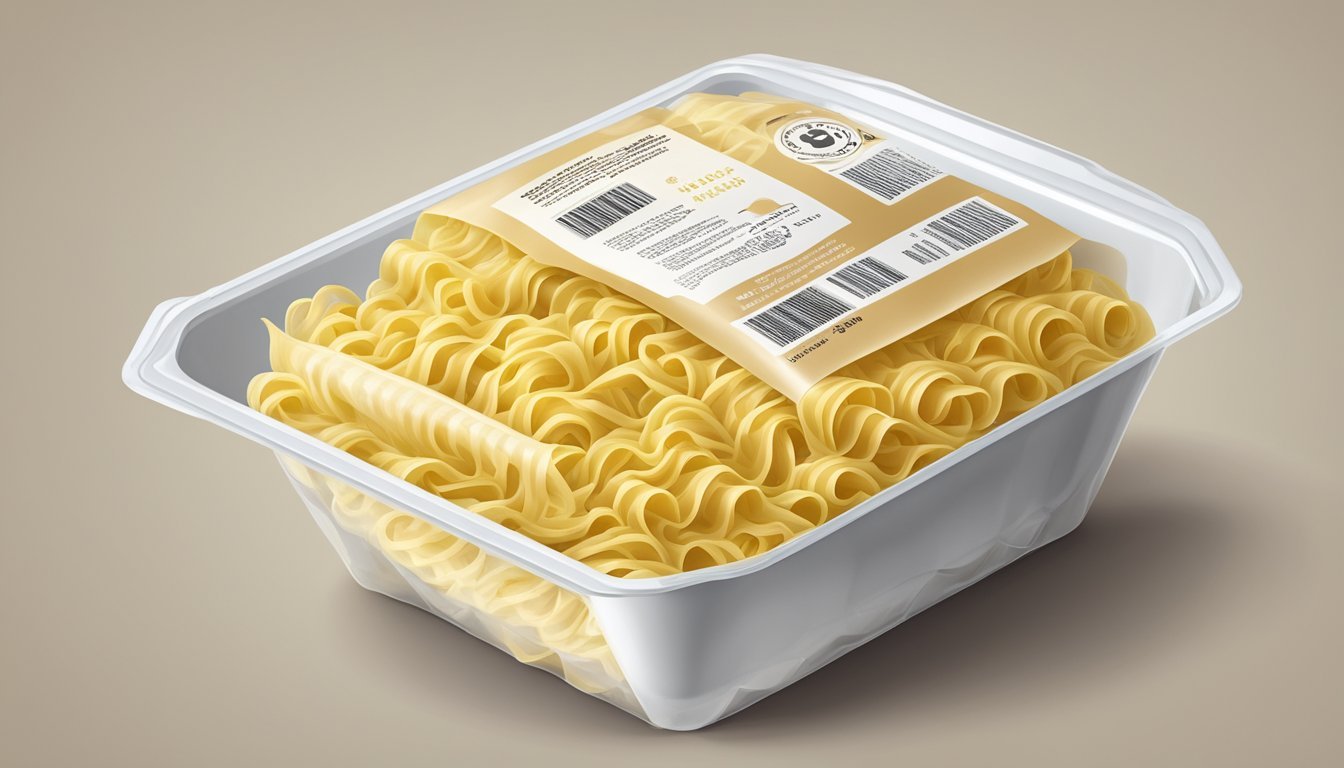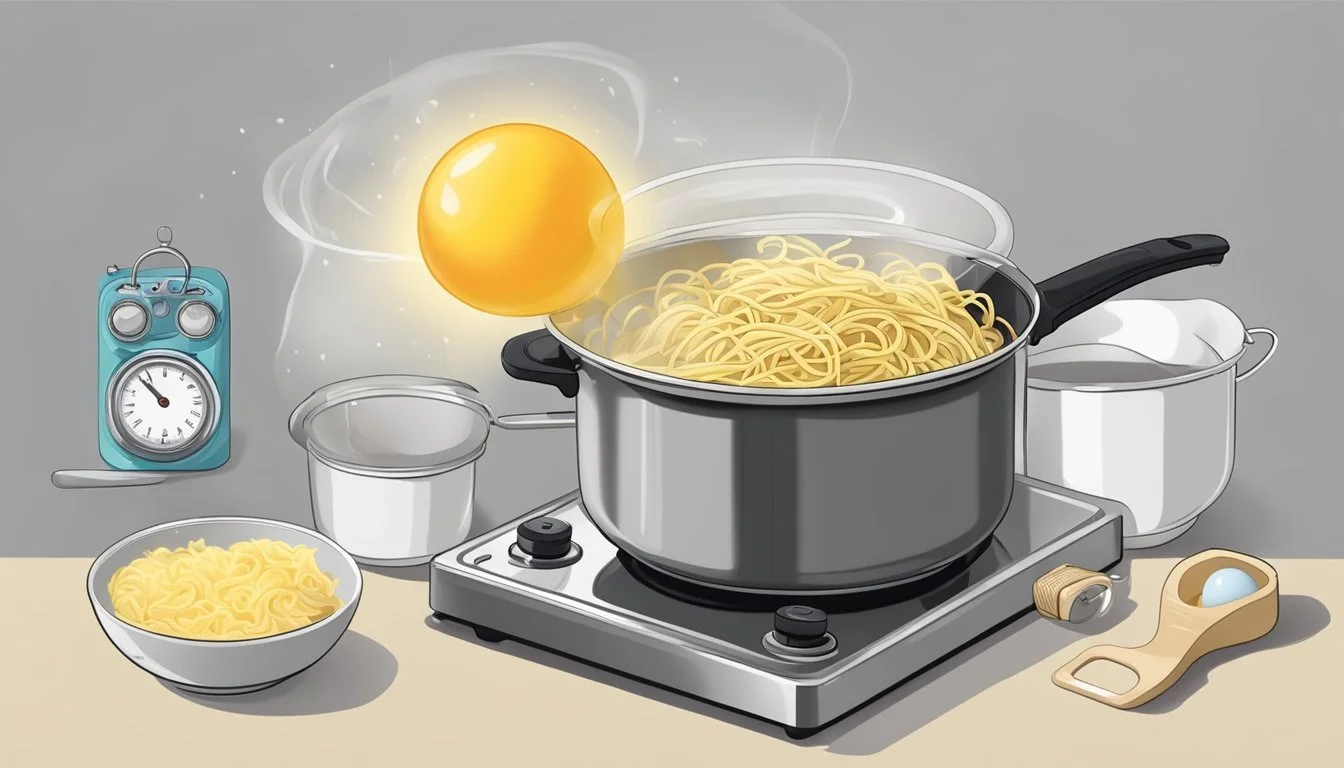How Long Do Egg Noodles Last?
Shelf Life and Storage Tips
Egg noodles (how long do egg noodles last?), a staple in many cuisines, have varying shelf lives depending on their state—dry, fresh, or cooked. The shelf life of egg noodles is significantly influenced by their storage conditions. Dry egg noodles, when stored properly at room temperature, retain their best quality for about two years. This is due to their low moisture content, which inhibits the growth of microorganisms responsible for food spoilage. Keeping the noodles in a cool, dry place, sealed in their original packaging, helps maintain their quality for the longest possible time.
Fresh egg noodles, on the other hand, contain more moisture and therefore have a shorter shelf life. They typically last for 2-3 days in the refrigerator, and for optimal taste, it's recommended to consume them within 18 hours of making. Flavored variations of fresh egg noodles may degrade faster, as additional ingredients like spinach or beetroot can affect their longevity. To extend the shelf life, one may freeze fresh egg noodles, ensuring they're stored in freezer-safe containers or bags.
Cooked egg noodles should be consumed within 3 to 5 days when stored in the refrigerator. Leaving cooked egg noodles at room temperature for more than 2 hours is not recommended, as bacteria grow rapidly between 40 °F and 140 °F, raising food safety concerns. Quality-wise, while egg noodles may not harbor bacteria past their prime, their flavor and texture may deteriorate, rendering them less enjoyable to eat.
Types and Characteristics of Egg Noodles
Egg noodles are a versatile pasta made primarily from flour and eggs, which influence their quality and nutritional value. The texture, shelf life, and cooking time of egg noodles can vary greatly depending on their type, be it dry, fresh, or homemade.
Dry Egg Noodles
Dry egg noodles are shelf-stable and are often found in the pantry section of grocery stores. They have a firm texture and take longer to cook than fresh noodles. A significant advantage is their long shelf life; when stored in a cool, dry place, they can retain their quality for up to 2 years. Dry egg noodles contain a lower moisture content than their fresh or homemade counterparts, making them less perishable.
Ingredients: Typically include durum or semolina flour (how long does semolina flour last?) and eggs.
Shelf Life: Up to 2 years in proper storage conditions.
Nutritional Value: Varies by brand but generally offers protein and carbohydrate.
Fresh Egg Noodles
Fresh egg noodles have a soft texture and are often found in the refrigerated section of supermarkets. They tend to cook faster than dry noodles due to their higher moisture content. Fresh egg noodles should be stored in the refrigerator and are best if used within 3-4 days of purchase to maintain quality and flavor.
Ingredients: Usually made with wheat flour and a higher proportion of eggs.
Shelf Life: 3-4 days when kept refrigerated.
Nutritional Value: Higher moisture makes them slightly lower in calories compared to dry noodles but similar in protein and carbs.
Homemade Egg Noodles
Homemade egg noodles are prepared from scratch, allowing for control over the ingredients and nutritional value. They can be tailored to individual taste preferences and dietary requirements. Typically, they should be consumed soon after making or they can be dried for longer storage. When properly dried and stored, they can last several months.
Ingredients: A simple mixture of eggs, flour, and sometimes salt.
Shelf Life: Usually consumed immediately, but can be dried for an extended shelf life of several months.
Nutritional Value: Depends on the chosen flour and number of eggs used, often richer in flavor and texture.
Storing Egg Noodles
Storing egg noodles properly ensures they maintain quality and freshness. Different methods are suited for dry and cooked noodles, and the key to longevity is the right environment.
At Room Temperature
Dry egg noodles should be kept in a cool, dry place such as a pantry or cabinet. They last for a considerable length of time when stored properly:
Shelf Life: 10 to 15 years
Storage Condition: Sealed in an airtight container with an oxygen absorber.
In the Refrigerator
Cooked egg noodles require refrigeration to prevent spoilage:
Shelf Life: 2-3 days
Storage Method: Place in an airtight container within the refrigerator.
Temperature: Maintain a consistent temperature inside the fridge to keep noodles fresh.
For fresh homemade noodles or those with added ingredients, such as vegetables or herbs:
Shelf Life: 1-2 days
Note: Flavored noodles may deteriorate in quality more quickly.
In the Freezer
To extend the shelf life of cooked egg noodles, freezing is a viable option:
Shelf Life: Up to 8 months
Storage Method: Place noodles in a freezer-safe container or bag.
Precaution: Thaw completely in the fridge before use to ensure even cooking.
Using these methods will help to preserve egg noodles longer, retaining their flavor and texture for future enjoyment.
Shelf Life and Expiration
When considering the shelf life and expiration of egg noodles, one should distinguish between uncooked and cooked states. Proper storage conditions significantly affect longevity and quality.
Uncooked Egg Noodles
Uncooked, commercially packaged egg noodles have a substantial shelf life. They maintain best quality for about 2 years when stored at room temperature in a cool, dry place. After the expiration date, while they may not spoil, the flavor can degrade. It's advisable to keep the package tightly closed to prevent exposure to moisture and other contaminants.
Shelf Life: Approximately 2 years
Best Quality: Maintained if stored properly
Safety Date: Beyond expiration, safety isn't compromised, but flavor might be
Cooked Egg Noodles
Once cooked, egg noodles should be promptly refrigerated. They remain suitable for consumption for 3 to 5 days when stored in an airtight container in the refrigerator. Cooked egg noodles should not be left at room temperature for more than 2 hours due to the risk of bacterial growth.
Refrigerated Life: 3 to 5 days for best quality
Safe Consumption: Up to 5 days if refrigerated properly
Note: Bacteria can rapidly grow between 40 °F and 140 °F
Safety and Spoilage Detection
Egg noodles' longevity is pivotal, but safety is paramount. Detection of spoilage is a critical skill to ensure egg noodles are safe for consumption.
Understanding Spoilage
Spoilage is the process by which food products deteriorate due to natural decay or bacterial contamination. Noodles may spoil due to improper storage conditions or expiration. Safe consumption depends on identifying such changes early to prevent foodborne illnesses.
Signs of Spoilage
Visual Indicators:
Discolored: Egg noodles should have a uniform color. Any discoloration may indicate spoilage.
Signs of Mold: Visible mold, which may present as spots of various colors, is a clear indication of spoilage.
Sensory Clues:
Off Odor: A rancid or unfamiliar odor emanating from the noodles serves as a warning.
Texture: Noodles that are slimy or have an unusual texture should not be consumed.
Spoiled egg noodles, identified through these indicators, pose a risk for contamination and should be discarded to ensure safety.
Methods to Extend Shelf Life
Maintaining the quality of egg noodles over time is contingent upon employing proper freezing techniques and selecting appropriate packaging for storage. These methods are crucial for preventing moisture, which can lead to spoilage, and protecting against pests and other contaminants.
Proper Freezing Techniques
Freezing egg noodles is an effective way to extend their shelf life. Egg noodles can be frozen for up to 8 months. To freeze egg noodles properly:
Spread them out on a baking sheet, making sure they are not clumped together, and freeze for a few hours.
Once they are individually frozen, transfer the noodles to a freezer-safe bag or container.
Remove as much air as possible from the bag to prevent freezer burn.
Label the packaging with the date of freezing to keep track of how long they've been stored in the freezer.
It's critical to first ensure the noodles are completely dry before freezing, as any excess moisture can lead to ice crystal formation, which can cause the noodles to clump together or become mushy upon thawing and reheating.
Packaging for Storage
The right packaging is paramount to protect egg noodles from pests, moisture, and air, all of which can shorten their shelf life. Ideal storage methods include:
Vacuum-sealed bags: These are excellent for removing air, which helps prevent both freezer burn when freezing and pest infiltration during pantry storage.
Airtight containers: Use containers that have a secure seal to keep noodles dry and safe from pests.
Mylar bags: These are suitable for long-term storage due to their light-blocking capabilities which can further extend the life of dried noodles.
The containers or bags should be tightly closed and stored in a cool, dry place to prevent the noodles from drying out and to maximize longevity. Regular checks of stored egg noodles ensure that they maintain quality and are safe for consumption.
Thawing and Reheating Egg Noodles
When it comes to egg noodles, proper thawing and reheating techniques are crucial for maintaining their quality and safety. This section provides precise methods for defrosting frozen egg noodles and reheating them to achieve the best texture and flavor.
Thawing
To safely thaw frozen egg noodles, one should transfer them from the freezer to the refrigerator. This ensures a gradual defrosting process, reducing the risk of bacterial growth. The process typically takes several hours, and once thawed, the noodles should be used within three to four days. It is important to note that egg noodles thawed in the microwave or cold water should be cooked immediately.
Refrigerator: Let the egg noodles thaw overnight.
Cold Water: Submerge in cold water, change every 30 minutes, and cook immediately.
Microwave: Use the defrost setting or heat at 50% power, checking frequently.
Reheating
When reheating egg noodles, the goal is to restore the noodles’ temperature without overcooking them. The noodles can be reheated on the stove by placing them in boiling water for a short cooking time until they are heated through. Alternatively, egg noodles can be reheated in a microwave. For either method, care should be taken to avoid drying out or overcooking the noodles, as this could deteriorate their quality and texture.
Boiling Water: Place them in boiling water for 30 seconds to 1 minute.
Microwave: Cover the noodles and heat, using short intervals and stirring occasionally.
Utilizing Egg Noodles in Recipes
Egg noodles are a versatile ingredient that can enhance the flavor and texture of numerous dishes. They can be used fresh, dried, or from leftovers and incorporated into various recipes ranging from hearty soups to cold salads.
Cooking with Egg Noodles
Egg noodles, when cooked properly, offer a soft yet firm texture, perfect for absorbing flavors. Cooking time is essential; fresh egg noodles typically require 3-5 minutes in boiling water, whereas dried egg noodles may need 6-8 minutes to reach the desired al dente texture. Here’s how to integrate egg noodles into various dishes:
Soups: Add them during the last few minutes of cooking to avoid over-softening.
Salads: Rinse cooked noodles in cold water before tossing with dressings and vegetables.
Stir-fry Dishes: Sauté the noodles with vegetables and proteins after boiling for a meal full of texture and flavor.
Recipe Ideas Using Leftovers
Leftover egg noodles are an excellent foundation for creative dishes. They can save time and reduce waste, also allowing the noodles to adopt new tastes and textures. Some suggestions include:
Casseroles: Combine leftovers with a mix of cheese, vegetables, and a protein source, then bake until bubbly.
Fritters: Bind noodles with egg, form into patties, and pan-fry for a crispy edge.
Salads can also benefit from leftover egg noodles; they incorporate well with vinaigrettes and robust ingredients. When utilizing leftovers, ensure they have been stored correctly and are not beyond 3-4 days old from the refrigerator to maintain quality and safety.
Assessing Quality and Freshness
When it comes to egg noodles, their longevity is closely linked to their quality and freshness. Proper assessment can prevent foodborne illness and ensure that the noodles maintain their nutritional value and taste.
Evaluating Freshness
Fresh egg noodles should be used within 3-4 days when stored in the refrigerator. One can evaluate their freshness by examining their appearance and color. Fresh egg noodles should have a consistent and vibrant color without any signs of discoloration. Should there be a presence of sliminess or an off odor, this typically indicates that the fresh noodles have gone bad and should not be consumed.
Determining Quality Over Time
Determining the quality of egg noodles over time requires attention to changes in taste, appearance, and texture. For dried egg noodles, the absence of moisture extends their shelf life, keeping them safe to consume for a long time with peak freshness within the first two years. Any deviation from their normal dry state, such as stickiness, clumping, or a rancid smell, indicates a decline in quality. One should inspect for the following signs:
Odor: A rancid or off smell is an immediate indicator of spoilage.
Mold: Any visible mold growth means the noodles are compromised.
Texture: If dried noodles become sticky or clump together, avoid using them.
The consumption of spoiled egg noodles can lead to foodborne illness, so if there's any doubt regarding their quality, it's safest to dispose of them.
Practical Tips for Handling Egg Noodles
Egg noodles, whether cooked or uncooked, require specific handling to maintain their quality and safety. This section provides practical measures to prevent spoilage and ensure that egg noodles are cooked to perfection.
Preventing Spoilage
Storage: Uncooked egg noodles should be kept in a cool, dry place if they are dry, and in the refrigerator if they are fresh. To maximize longevity, place uncooked egg noodles in a sealed container with an oxygen absorber. They generally retain quality for several years if stored properly in these conditions.
Refrigeration: Cooked egg noodles should be stored in the refrigerator and consumed within 3-5 days. Place them in an airtight container to prevent the absorption of other odors and flavors.
Signs of Spoilage:
A rancid odor
Discoloration
Signs of mold
Should these signs be present, it is crucial to discard the noodles to ensure safety.
Best Practices for Cooking
Texture: To avoid mushy noodles, cook them until they are al dente—tender but still firm to the bite. This texture ensures that they maintain integrity when mixed with sauces or included in recipes.
Cooking and Sauce Incorporation: For best results, egg noodles should be cooked in a large pot of boiling water and then added to sauces. If the noodles will be reheated, undercooking them slightly can prevent them from becoming mushy upon reheating.
Freezing: Cooked egg noodles can be frozen and are best used within 6 months. Thawing should be done in the refrigerator.
When incorporating egg noodles into recipes, it's essential to consider their capacity to absorb flavors and contribute to the dish's overall texture. By following these guidelines, egg noodles can be prepared safely and deliciously.

